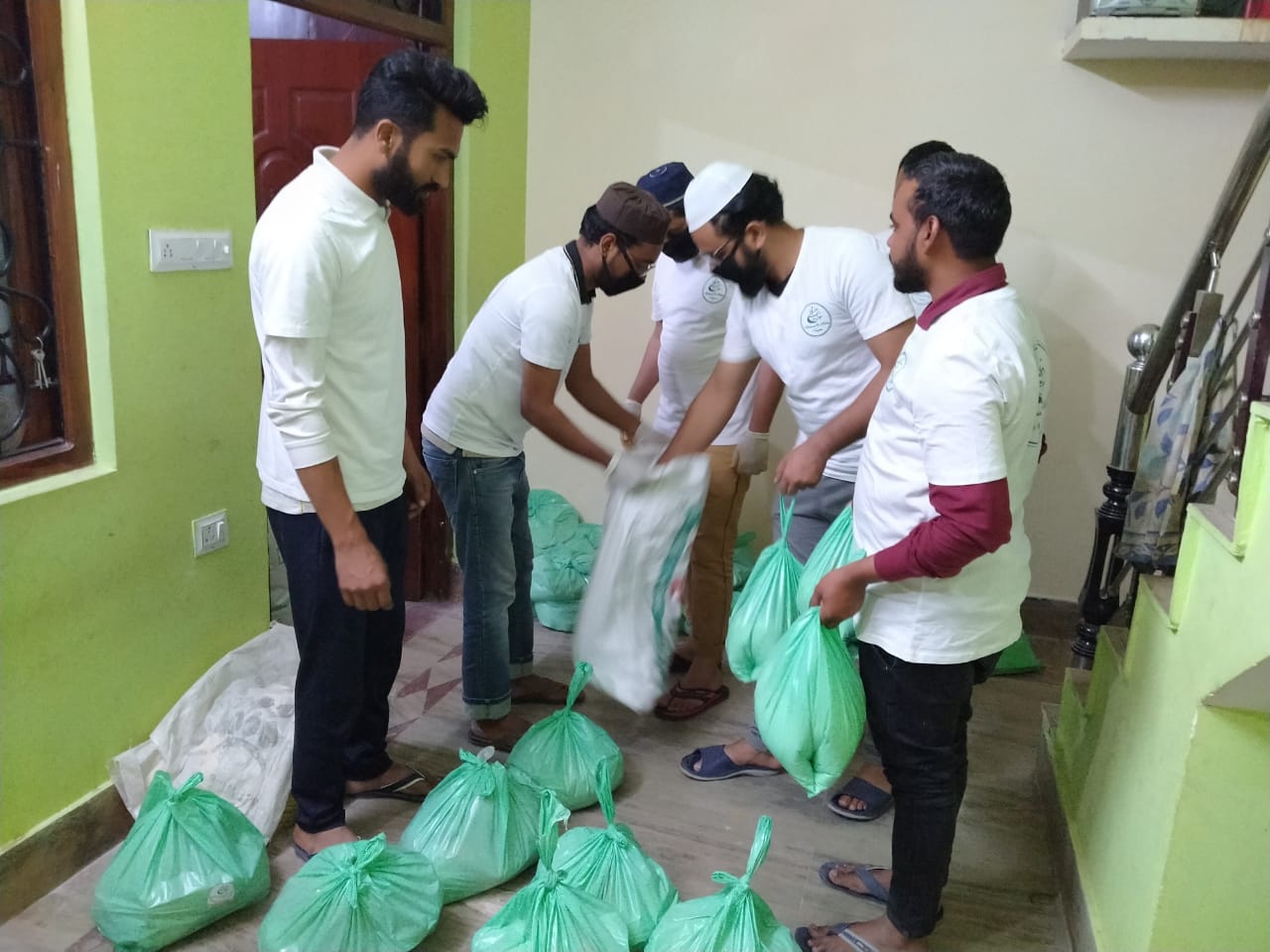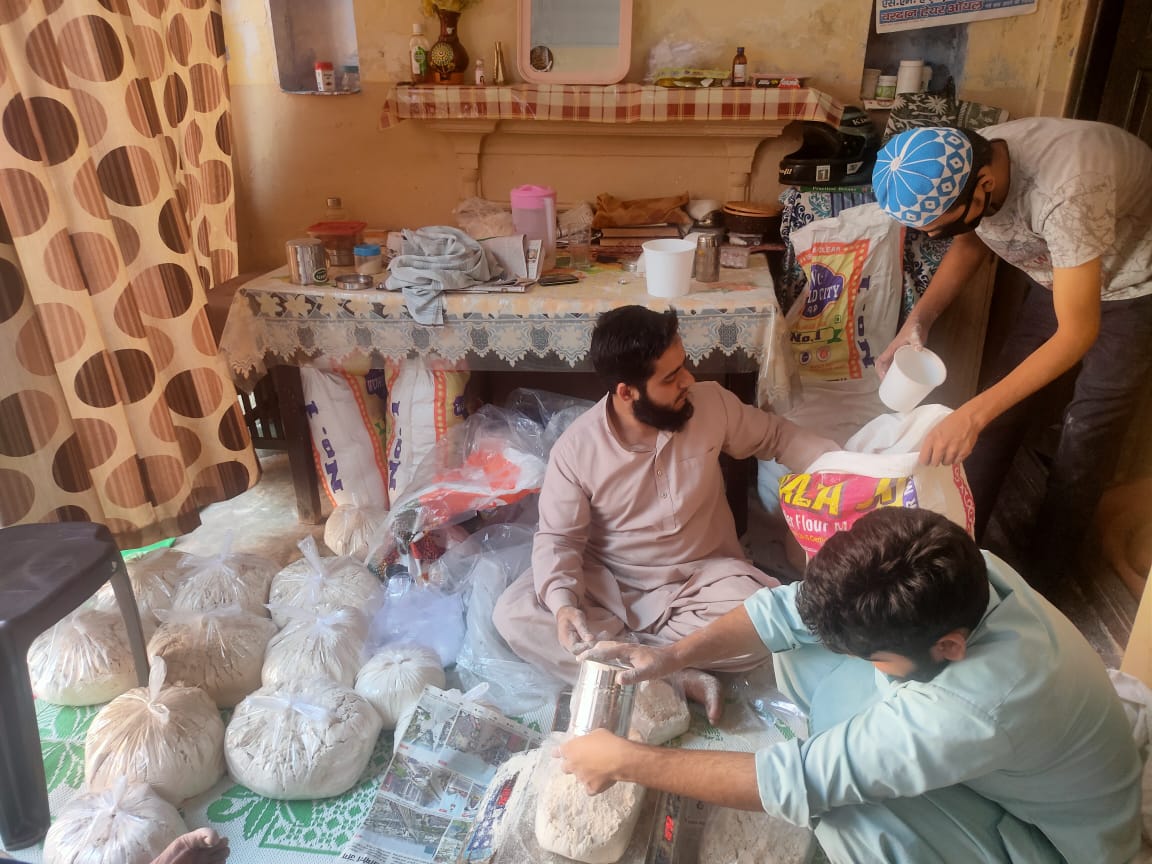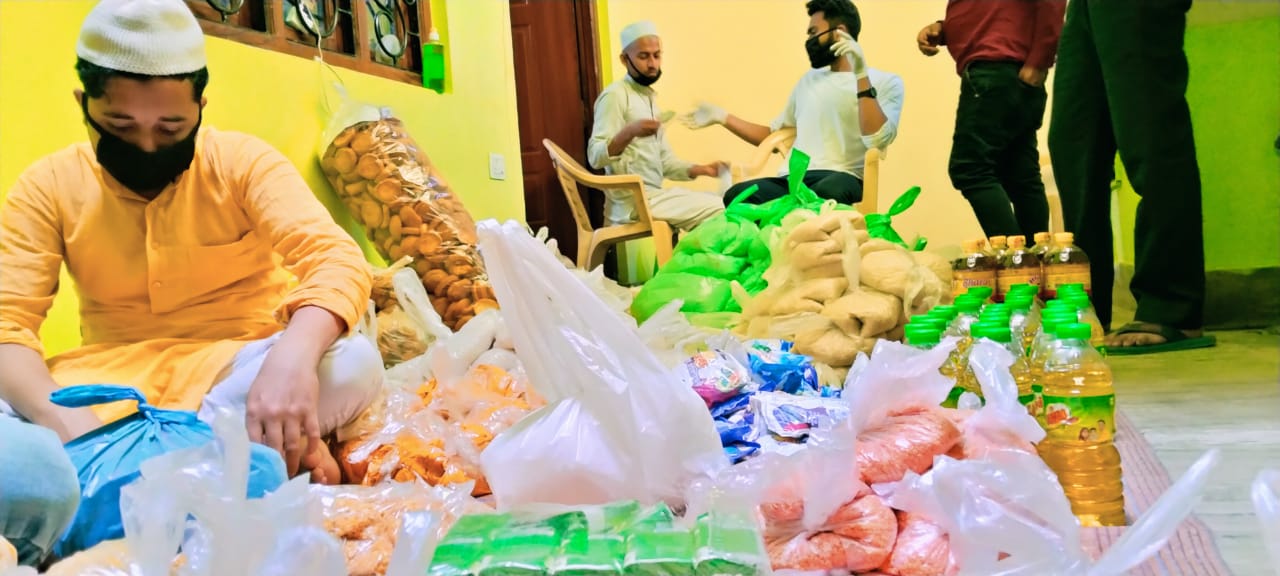While the world battling the COVID-19 pandemic and all systems have come to a halt, the worst affected are the poor and the daily wagers. India has seen lakhs and lakhs of migrant workers undertake a long walk home during the nationwide lockdown.
Amid this state of panic and chaos, there are many good samaritans who have come forward to help the needy by providing essential items.
“It is our responsibility, and that motivates us,” says 21-year-old Ansab Amir, an engineering student at Aligarh Muslim University (AMU), among the students at the university to have tied up with the Dar-ul-Mukhliseen (meaning the house of the honest).
The Aligarh unit of Dar-ul-Mukhliseen is one among the nine units in India. It has 15 members, who are all students at the university. The team members at Dar-ul-Mukhliseen collect funds and then procure essentials like aata (wheat flour), rice, dal (pulses), salt, potatoes, onions, masks and soap from the suppliers. However, due to panic buying it has become difficult for them to procure everything in sufficient quantity.
Amir says, “Only the privileged can panic buy, the poor can only panic.”
Aligarh is not the only place where people are stepping out to help. Uttar Pradesh’s Nagina, located in Bijnor district, has also seen the youth step out to do their bit.
“We had been planning to start an initiative to help people for a long time. We wanted to begin with education, but since the current situation is not right, we are helping people with food and essentials,” says 26-year-old Faizan Ahmad. Ahmad is a civil engineer and a member of Khidmat-e-Khalq (meaning to help the humanity).

Khidmat-e-Khalq volunteers at Nagina, Bijnor.
Khidmat-e-Khalq has around seven members who are helping people by providing them with food at home. “If they get food at home, they will not leave their houses,” says 24-year-old Shariq Riyazi, who is also a member of Khidmat-e-Khalq. People will die of hunger before the pandemic kills them, Riyazi said, highlighting the plight of daily wage labourers.
In another locality of Nagina, the Punjabi Mahavir Mandir Management, is also serving doing its bit for the cause. The management committee consists of around 20 members who provide medical help as well, if needed, along with the daily essentials. “The government is doing whatever they can, but it should not get too late,” says 23-year-old Akash Kalra, a student of Diploma in Education. Kalra says that they are even being supported by the MLA, who helps them if they approach him for any help.
Also read: With the Islamophobia Machine Back at Work, Even Mom WhatsApp Groups Aren’t Safe
Another Khidmat-e-Khalq initiative is in Sambhal district of Uttar Pradesh, where a group of ten people have gathered funds from locals to help the underprivileged. The initiative was by Zakir ur Rahman, a 22-year-old political science student at AMU. Rahman also helped people in Delhi’s Shiv Vihar after the riots. Talking about the funds Rahman told that not only local people donated but even some students gave their scholarships for the welfare of the needy.

Khidmat-e-Aawam volunteers at Sambhal, UP.
Suhail Rashid, a 20-year-old student pursuing his bachelors in Agriculture at Integral University, Lucknow, has given a major part of his scholarship of MOMA (Ministry of Minority Affairs) for the cause. “Mujhe laga jo haqdaar hain, chahe wo Muslim ho ya non-Muslim unhe milna chahiye (I thought those who really deserve the money, whether Hindu or Muslim, it should reach them)”, said Rashid. Khidmat-e-Khalq of Sambhal hands out oil, spices, sugar, tea and pulses among other essentials.
In addition to the Khidmat-e-Khalq there is another group of ten members who are working in the name of Khidmat-e-Awam (meaning the service of the people). The team has divided Sambhal in many parts and each area is assigned to a Zimmedar (responsible person) who takes care of the distribution and other logistics.
Also read: Coronavirus: Why It’s Important to Question the Government
The initiative is by 28-year-old Naved Alam Sajid, who works in Delhi. Sajid says that we make sure that we distribute the essentials at night so that people don’t feel ashamed. He also added, “Many people think we have begun too early and should have waited for the government help, but in my opinion, we have begun late, keeping in mind our economic condition right now.”
Another such initiative has been taken by the two brothers in Bareily, Uttar Pradesh. 34-year-old Junaid Ali Khan and 30-year-old Hammad Nabi serve rations and other daily essentials to the needy from door to door after a verification. They call their service as ‘Zarooratmandon ki Madad’ (help for the needy) and distribute essential items from 8 am to 11 am – which is the lockdown relief period in Bareilly.

Zarooratmando ki madad volunteers at Bareilly.
Each of the groups pay special attention to sanitation and safety of not only the team members, but also of those they are helping.
The rapidly growing COVID-19 cases across the nation has led many to think that the lockdown might get extended as per the need of the hour. In such a scenario, these groups intend to expand their services as much as possible.
The Khidmat-e-Khlaq of Bijnor claims that they have already distributed 50 kits which have essentials for a week, and after a week they will begin distribution again, as they are using this time to collect the required items. This is also a difficult task because of the shortage in supply and panic buying.
The Punjabi Mahavir Mandir Management on the other hand claims that they have enough stocks for another month.
However, Amir from Dar-ul-Mukhliseen believes that NGOs and civil societies will not be able to survive if the lockdown continues.
Salman Saleem is pursuing masters in Development Communication and Rashi is pursuing masters in Convergent Journalism at AJKMCRC, Jamia Millia Islamia, Delhi
All images provided by the author.

